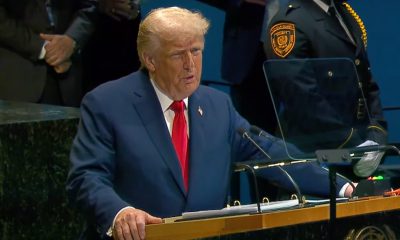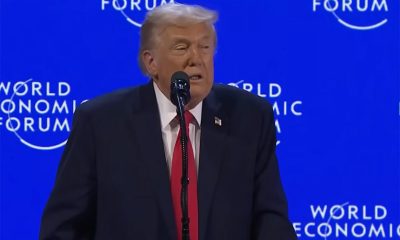Opinions
The alt-reality presidency
A strong early resistance offers hope
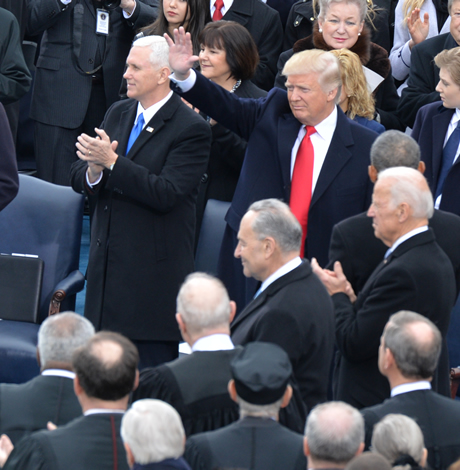
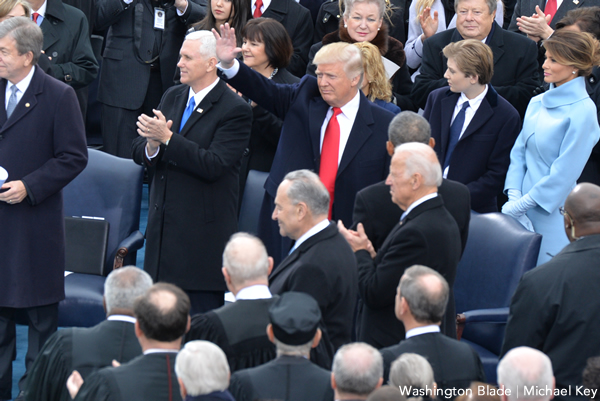
(Washington Blade photo by Michael Key)
In 1852, long before the advent of reality television, a self-taught former slave delivered what students of rhetoric know as the Fourth of July speech to the citizens of Rochester. It was a bracing tirade. Here is a snippet:
“Your prayers and hymns, your sermons and thanksgivings, with all your religious parade and solemnity,” are, to the slave, he said, “mere bombast, fraud, deception, impiety, and hypocrisy – a thin veil to cover up crimes which would disgrace a nation of savages.”
Frederick Douglass was an abolitionist, suffragist, author, and statesman. He died in 1895. Last week, our forty-fifth president, who shows no sign of an education, marked the beginning of Black History Month by reducing this legendary orator to an employee of the month: “Frederick Douglass is an example of somebody who’s done an amazing job and is getting recognized more and more, I notice.”
I suppose we should be grateful that our nitwit-in-chief quickly moved on to his favorite subject of himself before he could challenge Cedric the Entertainer’s character in Barbershop for the most offensive take on a revered African American. I only wish Trump were similarly fictional.
That was but one in a series of farcical incidents during Trump’s first two weeks in office. In a call to Mexican President Enrique Peña Nieto, Trump threatened an invasion to deal with that country’s “bad hombres.” In a call to Australian Prime Minister Malcolm Turnbull, he insulted our staunch ally over 1,250 refugees we had agreed to take. At the National Prayer Breakfast, he jokingly called for prayers to lift Arnold Schwarzenegger’s ratings for “The Apprentice.” He signed an executive order against refugees without consulting anyone with a clue or a Constitution, then insulted a judge for blocking his dictatorial impulses. He decided he could botch a raid in Yemen just as well from the dinner table as from the Situation Room. He excused Vladimir Putin’s murder of opponents and critics by suggesting America is just as bad. His counselor Kellyanne Conway cited a nonexistent Bowling Green Massacre and slammed the press for not covering it.
Some of us clung to our sanity by trading memes. The slogan “I’m with her” accompanied a picture of the Statue of Liberty. A still from the Alien film series was posted in which the horrible creature getting up in Ripley’s face was replaced with Ms. Conway.
I’m afraid we are giggling past the graveyard. Gay friends of mine who came to America seeking asylum from persecution remain afraid despite assurances from their attorneys. They wonder what Trump will do next. A draft executive order has been circulating that would allow discrimination in the name of religious freedom, ignoring the fact that mutual tolerance is the bedrock of a diverse society. Congressional Republicans moved to gut healthcare and financial reforms, repeal ethics rules, abolish environmental protections, even restore gun access to the mentally ill.
A bright beacon during these dark days has been the surge of protest and action by everyone from immigration attorneys and the ACLU to ordinary citizens in response to Trump’s constitutionally questionable executive order aimed at Muslim refugees. Acting Attorney General Sally Yates sacrificed her job by refusing to defend the order. A rebuke from the Gospel struck a deep chord in many Christians: “I was a stranger and you did not welcome me.” (Matthew 25:43)
The Resistance is in its early stages. Republicans control both ends of Pennsylvania Avenue, and at this point are showing more unity than Democrats, who as Sen. Elizabeth Warren points out, are in need of a backbone. Several cabinet nominees have been (or are about to be) confirmed whose records conflict with the missions of their agencies. The president’s closest advisor is Steve Bannon, who, as House Democratic Leader Nancy Pelosi observed, is a white supremacist.
During his takedown of red-baiting Sen. Joe McCarthy in 1954, journalist Edward R. Murrow reminded American viewers, “We are not descended from fearful men.” He was holding ordinary citizens responsible for the evil done in their names. In a similar vein, Sen. Kamala Harris tweets: “If you’ve ever wondered what you would have done during the Civil Rights Movement, this is your opportunity to find out. #goodtrouble”
Richard J. Rosendall is a writer and activist. He can be reached at [email protected].
Copyright © 2017 by Richard J. Rosendall. All rights reserved.

Some people excuse the sick felon in the White House for confusing Iceland and Greenland, after all, they are both cold. Actually, he is a senile old fool, and people must consider whether he should be locked up and kept out of trouble. The only problem with that is J.D. Vance. He could be worse, because however disgusting, he is smarter. After all, he once compared Trump to Hitler.
The felon creates problems and then thinks when he backtracks on what he said or did, he should get credit for solving the problem he created. Recently the stock market plummeted 800 points in one day, based on the stupid things he said about attacking Greenland and imposing tariffs on our allies. When he changed his mind and backtracked, he took credit for the market going up. In some ways it simply looks like insider trading, when his friends and family knew what he was going to do. To others, it is simply a ploy to get Epstein off the front pages, and based on our media not doing their job, it’s working.
His speech in Davos was totally embarrassing. Joe Biden clearly lives in his head since he defeated him in 2020. He apparently blames Biden for the fact that during Biden’s presidency, Trump was charged and convicted of various crimes including 34 felonies.
He recently told the New York Times he can do anything he wants as president, as long as it doesn’t conflict with his own morality. Since he has none, he believes he can do anything. Now we see being King of the United States is not enough; he wants to be an emperor. Hence his formation of the ‘Board of Peace.’ Simply another way of grifting, as he is asking for a billion dollars from each member, and there are no obvious controls on the money. It will not be a success, again except for his looting it, when you look at who signed up to join this organization. Members include: three ex-Soviet apparatchiks, two military-backed regimes, and a leader sought by the International Criminal Court for alleged war crimes, with only two EU countries, Bulgaria and Viktor Orban’s Hungary, according to the Financial Times.
Then on his way out the door from Davos, he made the United States, and himself, look even worse, when as reported by CBS news, “President Trump claimed the U.S. had ‘never needed’ its NATO allies, and that allied troops had stayed ‘a little off the front lines’ during the 20-year war in Afghanistan.” This was entirely untrue and actually, “The only time NATO has ever enacted Article 5 was after the 9-11 terrorist attacks on the United States, and the world rallied to the support of the U.S.,” Alistair Carns, the U.K. government’s Minister of the Armed Forces and a veteran who served five tours in Afghanistan alongside American troops, said in a video posted Friday on social media. “We shed blood, sweat and tears together, and not everybody came home. These are bonds, I think, forged in fire, protecting U.S. or shared interests, but actually protecting democracy overall.”
More than 2,200 American troops were killed in Afghanistan, according to the Pentagon. The Reuters news agency says 457 British military personnel, 150 Canadians and 90 French troops died alongside them. Denmark lost 44 troops in Afghanistan — in per capita terms, about the same death rate as that of the United States.”
“Lucy Aldridge, the mother of the youngest British soldier killed in Afghanistan, told the BBC she was “deeply disgusted” by Mr. Trump’s comments. Her son William Aldridge was only 18 years old when he was killed in a 2009 bomb blast, while trying to save fellow troops.”
We are being represented on the world stage by a sick, evil, blathering idiot, who has no idea of history, no morality, and no decency. He was called out on this by the prime minister of the U.K., Keir Starmer, who normally appears to play up to the felon, when he called the remarks “insulting and frankly appalling.” He went on to say, “We expect an apology for this statement. Trump has “crossed a red line’, we paid with blood for this alliance. We truly sacrificed our own lives.”
Every day Trump slides more into the sewer, spreading hate, and violence, both here at home, and around the world. If there are any decent people left around him, unfortunately there may be none, for the good of humanity, they must stop him.
Peter Rosenstein is a longtime LGBTQ rights and Democratic Party activist.
Commentary
Defunding LGBTQ groups is a warning sign for democracy
Global movement since January 2025 has lost more than $125 million in funding

In over 60 countries, same-sex relations are criminal. In many more, LGBTIQ people are discriminated against, harassed, or even persecuted. Yet, in most parts of the world, if you are an LGBTIQ person, there is an organization quietly working to keep people like you safe: a lawyer fighting an arrest, a shelter offering refuge from violence, a hotline answering a midnight call. Many of those organizations have now lost so much funding that they may be forced to close.
One year ago this week, the U.S. government froze foreign assistance to organizations working on human rights, democracy, and development worldwide. The effects were immediate. For LGBTIQ communities, the impact has been severe and far-reaching.
For 35 years, Outright International has helped build and sustain the global movement for the rights of LGBTIQ people, working with local partners in more than 75 countries. Many of those partners are now facing sudden closure.
Since January 2025, more than $125 million has been stripped from efforts advancing the human rights of lesbian, gay, bisexual, transgender, intersex, and queer people globally. That figure represents at least 30 percent of yearly international funding for this work. Organizations that ran emergency shelters, legal defense programs, and HIV prevention services have been forced to close or drastically scale back operations. At Outright alone, we lost funding for 120 grants across nearly 50 countries. We estimate that, without intervention, 20 to 25 percent of our grantee partners risk shutting down entirely.
But this is not only a story about one community. It is a story about how authoritarianism works, and what it costs when we fail to recognize the pattern.
The playbook is not subtle
Researchers at Outright and partners across human rights and democracy movements have documented the same sequence playing out across sectors worldwide: governments defund organizations before passing restrictive legislation, eliminating the groups most likely to document abuses before abuses occur.
In December, CIVICUS downgraded its assessment of U.S. civic freedoms from “narrowed” to “obstructed,” citing what it called a “rapid authoritarian shift.” The message was unmistakable: independent organizations that hold power to account are under growing pressure, in the United States and around the world.
And the effects have cascaded globally. When one of the world’s largest funders of democracy support and human rights work withdraws, it doesn’t just leave a funding gap. It sends a signal to authoritarians everywhere: the coast is clear.
The timing is not coincidental. In the super election year of 2024, 85 percent of countries with national elections featured anti-LGBTIQ rhetoric in campaigns. Across the 15 countries we tracked, governments proposed or enacted laws restricting gender-affirming care, rolling back legal gender recognition, and censoring LGBTIQ expression. The defunding often came first. Governments know that if they can starve the movement, there will be no one left to document what comes next.
Why US readers should care
It may be tempting to see this as a distant crisis, especially at a moment when LGBTIQ rights in the United States are under real pressure. But this story is closer to home than it appears. American funding decisions often help determine whether organizations protecting LGBTIQ people abroad can keep their doors open. And when independent organizations are weakened, no matter where they are, the consequences do not stay contained. The same political networks driving anti-LGBTIQ legislation in the United States share strategies and resources with movements abroad. Global repression and domestic rollback are not separate stories. They are the same story, unfolding in different places.
LGBTIQ organizations are often the first target, but never the last
Why target LGBTIQ communities first? Because we are politically easier to isolate. The same playbook — foreign funding restrictions, bureaucratic harassment, banking access denial — is now being deployed against environmental groups, independent media, women’s rights organizations, and election monitors. When one part of our community is silenced, all of us become more vulnerable. What happens to us is a preview of what happens to everyone.
This is not speculation. It is documented history. In Hungary, the government restricted foreign funding for civil society before passing its “anti-LGBTQ propaganda” law. In Russia, “foreign agent” designations preceded the criminalization of LGBTIQ identity. In Uganda, funding restrictions on human rights organizations came before the Anti-Homosexuality Act. The pattern repeats because it works.
And yet, even as these attacks intensify, victories continue. In 2025, Saint Lucia struck down a colonial-era law criminalizing consensual same-sex intimacy after a decade of regional planning and coalition-building. Courts in India, Japan, and Hong Kong upheld trans people’s rights. Budapest Pride became the largest in Hungarian history — and one of the country’s biggest public demonstrations — despite a government ban. In Thailand, years of patient advocacy culminated in marriage equality becoming law in 2025, the first such victory in Southeast Asia.
These wins happened because our movement built the capacity to survive hostility. Legal defense funds. Documented evidence. Regional coalitions. Emergency response networks. The organizations behind these victories are precisely the ones now facing drastic funding cuts and even closure.
What we are doing and what we need
On Jan. 20, 2026, Outright International publicly launched Funding Our Freedom, a $10 million emergency campaign running through June 30, 2026. We have already secured over $5 million in pledges from more than 150 donors. But the gap remains enormous.
The campaign supports two priorities that must move together. Half of the funds go directly to frontline LGBTIQ organizations facing sudden shortfalls: keeping staff paid, maintaining safe spaces, securing legal support, and continuing essential services. The other half supports Outright’s global work: documenting abuses, training activists, and advocating for LGBTIQ inclusion at the United Nations and other international forums. This is how LGBTIQ people remain seen, heard, and defended, even when governments attempt to erase them.
We structured Funding Our Freedom this way because frontline support without protection is fragile, and global advocacy without frontline truth is hollow. Both must survive.
Funding Our Freedom is not charity. It is how we keep the global LGBTIQ movement alive when governments try to erase it.
A call to those who believe in equality and democracy
If you are part of the LGBTIQ community, this moment is personal. Whether you give, share this work, host a small fundraiser, or bring others into the effort, you become part of what keeps our global community connected and protected.
If you are an ally or simply someone who believes in fairness, free expression, and accountable government, this fight is yours too. The defunding of LGBTIQ organizations is not an isolated decision. It is a test case. If it succeeds, the same tactics will be used against every group that challenges power and defends vulnerable people.
We are not asking for sympathy. We are asking for commitment. The organizations now being forced to close are the ones that document abuses, provide legal defense, support people in crisis, and show up when no one else will. If they disappear, we lose more than services. We lose the ability to know what is happening and to respond.
Authoritarians understand this. That is why they target us first.
The question is whether the rest of us understand it in time.
Maria Sjödin is the executive director of Outright International, where they has worked for over two decades advocating for LGBTIQ human rights worldwide. Learn more at outrightinternational.org/funding-our-freedom.
Opinions
ICE agents murder another American citizen in Minneapolis
Trump and his Cabinet are the real ‘domestic terrorists’
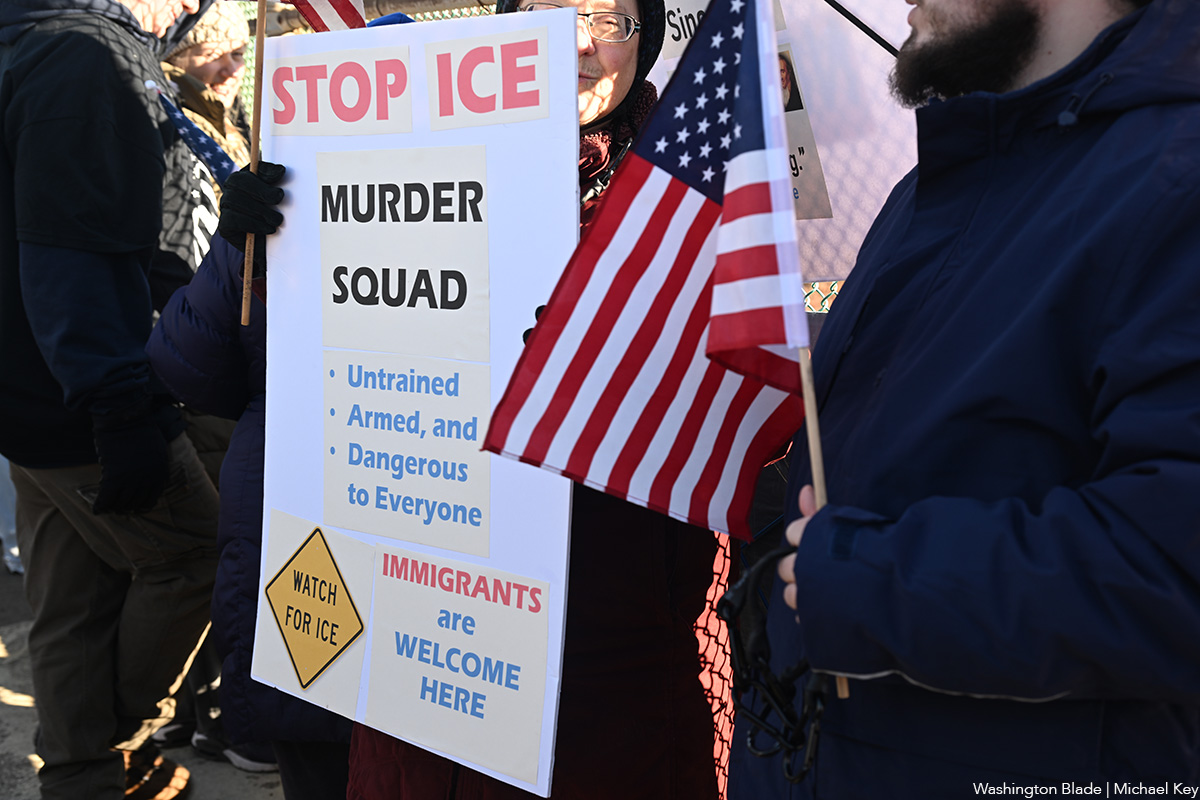
ICE agents murdered another American citizen on the streets of Minneapolis. His murder is both caused, and condoned, by the evil felon in the White House, and his incompetent, and equally evil, Secretary of Homeland Security, Kristie Noem. She, the woman who thought nothing of killing her dog, now apparently thinks nothing of killing American citizens. The most recent murder, condoned by both of them, occurred on Jan. 24 and was that of Alex Jeffrey Pretti, a 37-year-old U.S. citizen.
His grieving parents released a statement, “We are heartbroken but also very angry. Alex was a kindhearted soul who cared deeply for his family and friends and also the American veterans whom he cared for as an ICU nurse at the Minneapolis VA hospital. Alex wanted to make a difference in this world. Unfortunately, he will not be with us to see his impact. I do not throw around the hero term lightly. However, his last thought and act was to protect a woman. The sickening lies told about our son by the administration are reprehensible and disgusting. Alex is clearly not holding a gun when attacked by Trump’s murdering and cowardly ICE thugs. He has his phone in his right hand, and his empty left hand is raised above his head while trying to protect the woman ICE just pushed down all while being pepper sprayed. Please get the truth out about our son. He was a good man. Thank you.”
All this occurred amid heightened tensions in the city following recent clashes over federal immigration actions. The chaos in Minneapolis is clearly caused by the federal agents. We have also been told by the Minneapolis police that Pretti had no criminal record beyond minor traffic violations and held a valid Minnesota permit to carry a concealed weapon. His family said they had never seen him carry it.
The chaos in Minneapolis was heightened after an ICE agent murdered Renee Good, while she was in her car. The agent who shot her was clearly seen in videos to be in no danger. “An autopsy commissioned by the family this month, found that she suffered three clear gunshot wounds, including one to her head, lawyers for her family said Wednesday. One of the injuries was to Good’s left forearm, the lawyers said in a statement, while another gunshot struck her right breast without piercing major organs. Neither of those wounds was immediately life-threatening, the attorneys said. A third shot entered the left side of Good’s head near the temple and exited on the right side, according to the statement, and she also appeared to have sustained a graze wound.”
After both these murders, the felon and his lapdog, Noem, claimed the murders were appropriate as both victims were ‘domestic terrorists.’ In both cases they told Minnesota law enforcement they could not participate in the investigation. Clearly, they don’t want real investigations. It has become crystal clear, the felon in the White House considers anyone who disagrees with him, or his policies, a ‘domestic terrorist’. I, and so many others, consider the felon, and his personal Goebbels, Stephen Miller, along with Noem, and others in his Cabinet, to be the real ‘domestic terrorists.’
In my lifetime, I have never seen a president declare war on American citizens, but that is what this president is doing. He is sending federal agents, including the National Guard, into cities across the nation, to fight with, and threaten to curb, the legal actions of American citizens. He is a clear danger to our democracy, and is being assisted by the Republicans in Congress, and the Supreme Court. They are all guilty of enabling his vicious attacks on all of us.
When Renee Good and Alex Pretti were gunned down, we all suffered. We were all attacked, when they were attacked. None of us can feel safe if during a legal demonstration, we can be murdered, and no one will step forward to stop it from happening. We live in a country where our Secretary of Health and Human Services, RFK Jr., is literally killing children by saying they shouldn’t be vaccinated against diseases that can be prevented with a vaccine and by ending research into Alzheimer’s, cancer, and HIV/AIDS. This is the government of the felon, and his campaign against our own people.
Every person in a minority, or group who has ever been discriminated against, is at risk while the felon is in the White House. Whether you are a woman, Black, Asian, Latino, Jewish, Muslim, or LGBTQ, you are being threatened by this administration, your rights, and even your life, are being threatened. We must all stand together, and work to stop him, or as the poem, “First They Came,” attributed to Lutheran pastor Martin Niemoller, will prove to be true. There are many versions of the poem and just put your group in any of the paragraphs, and you will clearly understand its meaning. The United States Holocaust Memorial Museum quotes the following text as one of the many poetic versions:
First, they came for the socialists, and I did not speak out—Because I was not a socialist.
Then they came for the trade unionists, and I did not speak out—Because I was not a trade unionist.
Then they came for the Jews, and I did not speak out—Because I was not a Jew.
Then they came for me—and there was no one left to speak for me.
Peter Rosenstein is a longtime LGBTQ rights and Democratic Party activist.
-

 Federal Government5 days ago
Federal Government5 days agoTop Democrats reintroduce bill to investigate discrimination against LGBTQ military members
-

 Virginia5 days ago
Virginia5 days agoFrom the Pentagon to politics, Bree Fram fighting for LGBTQ rights
-

 Iran4 days ago
Iran4 days agoTwo gay men face deportation to Iran
-

 Commentary4 days ago
Commentary4 days agoDefunding LGBTQ groups is a warning sign for democracy

